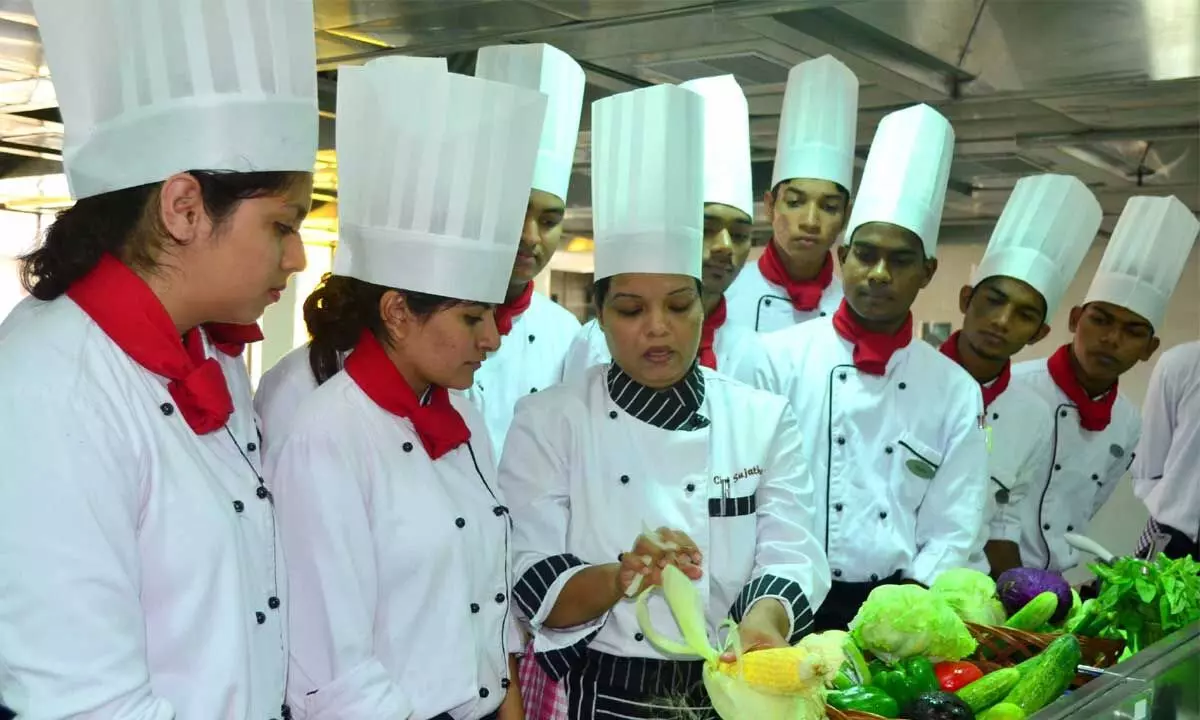New concepts and innovations in hospitality education

New concepts and innovations in hospitality education
Empowering students to acquire new-age skills for different roles
The new-age technologies, such as Artificial Intelligence (AI), Machine Learning (ML) and Internet of Things (IoT), play a game-changing role. Reflective of the advances in technology plugged in the industry, educational institutes are also catching up with new ideas, technologies and concepts, empowering students to acquire new-age skills for different roles.
The hospitality education has undergone a major transformation in line with rising globalization, evolving market dynamics, consumer expectations, and technological advancements. Indeed, this changing world has altered the hospitality landscape, which is one of the key drivers of employment at all levels on a global scale. This has led to the adoption of new concepts and innovations in hospitality education.
Starting with innovation as a technique to resolve contemporary issues, educators are focusing on blending existing educational challenges with the revised hospitality curriculum design to not only preach innovation but bring it in practice as well. Today hospitality institutes are acting as incubators for developing talents to help students lead the industry in varied capacities, such as experience curators, entrepreneurs, food critics, food designers, digital marketers, business strategists, etc.
Educators are helping students understand the very foundation of innovation and how to use it in every context. Educators are showcasing to students the fact that innovation comes in different forms and it does not always require technology-powered solutions through the power of creative thinking, emotional intelligence, talent management, and teamwork.
It involves redesigning processes, realigning services, and revamping offerings. In its generic form, innovation can be broadly classified under three categories - product innovation, service innovation and process innovation. The current times, governed by unprecedented events, are pushing hospitality education towards training and learning based modules, adapting a ''vocational approach'' and promoting soft skills as much as hard skills to cater to the complexities of the industry. These soft skills, also known as human skills, include interpersonal skills, strategic communication, emotional intelligence, relationship management, conflict resolution, flexibility and quick decision making.
Cobots
One of the ultra-modern support equipments used to assist teachers, which is gaining popularity across the globe, is a collaborative robot. It is also known as a cobot—a robot capable of learning and conducting multiple tasks to assist and work alongside human beings. If used by universities and higher education institutions, these cobots would prove beneficial to teachers and administration officials in cutting down their monotonous manual work, minimising their workload and helping them focus on more important aspects of teaching and training students. The availability of such futuristic technology marks the beginning of a new education revolution.
It's not just the educators that benefit from the digitally-powered revolution in the education sector, but also the students as it helps in elevating their learning experience and assists them in exploring career avenues that remained unexplored or least explored so far.
Virtual reality
Switching to Virtual Reality is another way how education institutions have started integrating advanced technologies in their learning techniques on a broader scale to help learners gain a better understanding of the concepts through experiential education. The novel interplay of technologies such as Artificial Intelligence (AI), Machine Learning (ML), Virtual Reality (VR), and Internet of Things (IoT) are helping institutes not to challenge and do away with traditional pedagogical practices but to work collaboratively fusing the best elements of both the sides. The intelligent blending of theoretical concepts with virtual training is done to create an experimental way of learning.
The successful combination of virtual reality and gamification shows the power of this fusion. The duo creates an environment where the learners are driven by motivation and interested in studying because of the engagement factor generated even without the presence of an educator.
The same combination of storytelling and real-life scenario creation is created through VR and gamification to help students attain creative thinking and problem-solving techniques. It also helps educators in their teaching approach, especially when explaining complex concepts.
Virtual Reality (VR) alone has the potential to convert classroom learning into professional spaces. The current VR solutions offered by some of the premium hospitality institutes such as Les Roches are already transforming physical classrooms into hours of professional training. Some of such global education disruptors are employing VR concept to train students to operate check-in/check-out (or other services) with virtual customers (bots).
Holistic learning environment
Several education institutes such as Les Roches, have adopted technological platforms to provide a flexible learning environment to students, giving them the power to customize education, such as allowing them to set their classroom time, suiting their schedule, especially in the case of working professionals and part-time learners.
This modernistic take on classroom learning has lifted the burden of attending the class in a constrained manner and rather created a room for progressive thinking, engaging discussions, ideation and experiential training methods. This helps in creating a holistic learning environment for the overall growth of students. Further, the technological tools mentioned above also empower institutions making them more connected with the industry personnel and trends. It has blurred the differentiation between separate training labs and classrooms.
It is worth mentioning that technological tools have enabled institutes to provide customized learning experiences to each student, helping them in knowing their strengths and working on things they struggle with. Adopting such a personalized learning approach is to create a growth-conducive environment where all students hone and sharpen their skills. These revolutionary ideas, including teaching in small groups and flexible study plans supported by educators and industry experts, help students become future leaders.
(The author is the Director of Spark Crans-Montana)








